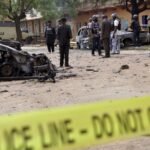The Zango Kataf crisis of 1992 was a violent ethnic conflict that occurred in the Zango Kataf area of Kaduna State, Nigeria. The crisis was between the Hausa-Fulani Muslim community and the Kataf ethnic group, who are predominantly Christian.
The crisis started on May 16, 1992, when a dispute arose over the construction of a mosque in the town of Zonkwa. The dispute quickly escalated into a violent conflict, with both sides attacking each other with weapons such as guns, machetes, and clubs.
The conflict lasted for several days and resulted in the deaths of hundreds of people, as well as the displacement of thousands of others. Many homes and businesses were also destroyed during the violence.
The Nigerian government deployed military troops to the area to restore peace, and a commission of inquiry was set up to investigate the causes of the crisis and make recommendations for preventing future conflicts.
The Zango Kataf crisis was one of several ethnic and religious conflicts that have occurred in Nigeria over the years, and it highlighted the challenges of managing diversity in a country with over 250 ethnic groups and multiple religions. The crisis also underscored the need for effective conflict resolution mechanisms and the importance of promoting tolerance and understanding between different groups in the country







